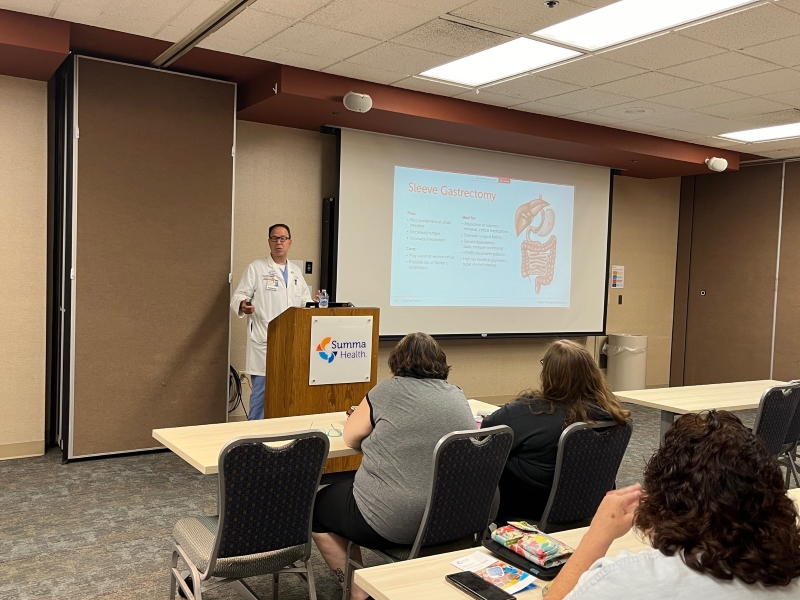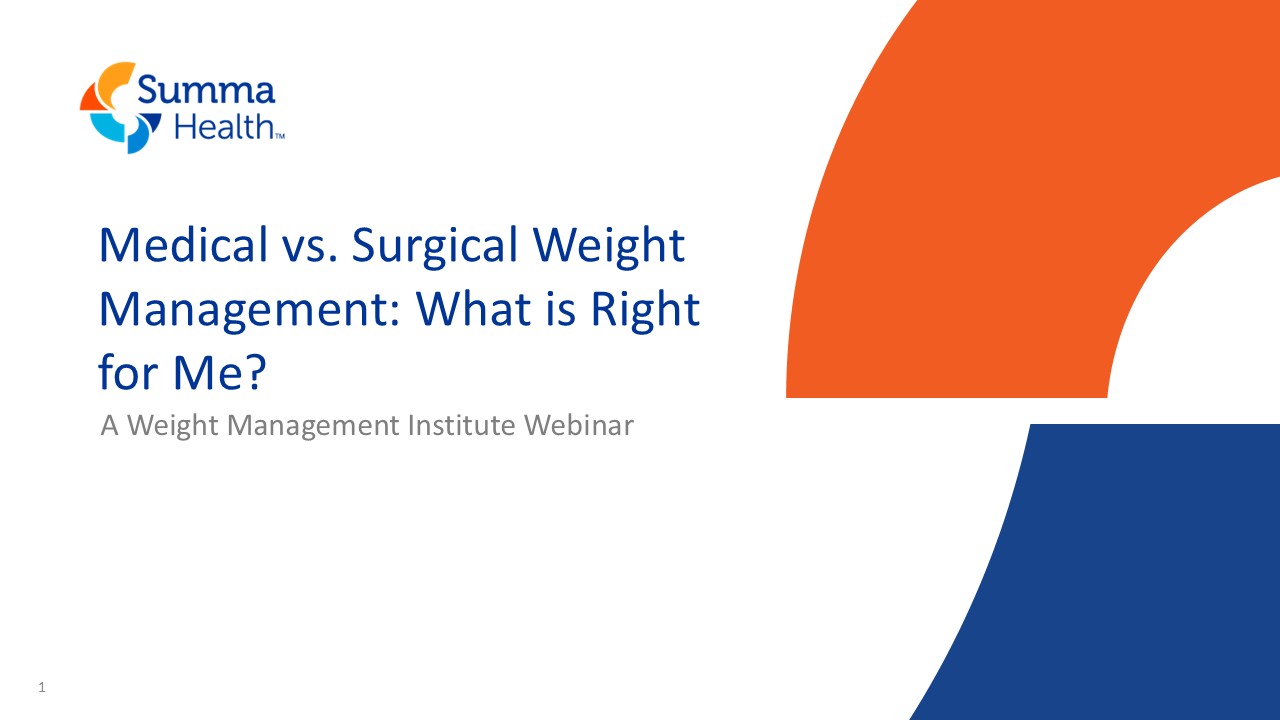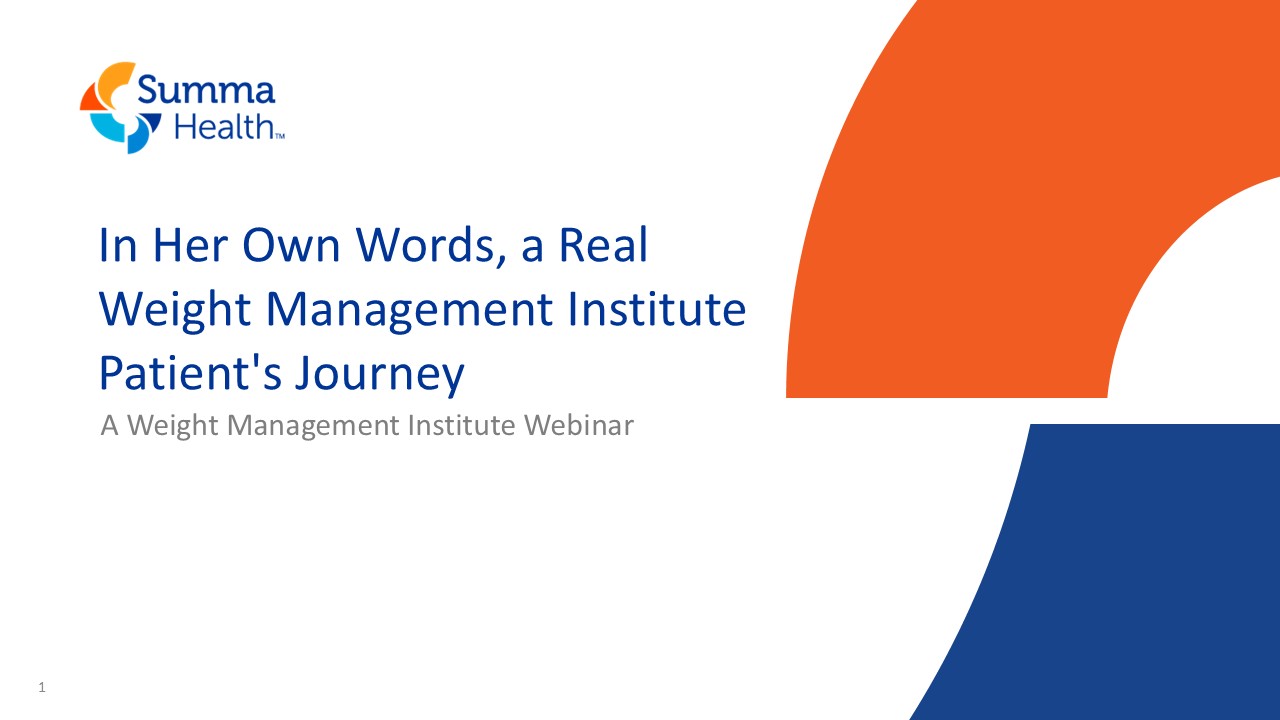Summa Health is committed to continuously furthering the awareness of and the understanding of obesity as a chronic disease, and to the development of treatment options that produce the best possible outcomes for our current and future patients. We accomplish these goals through awareness, events, education and research.
Join our Support Group - this support group is for patients before and after weight loss surgery.

Register for our Weight Management Classes
We offer several classes, both in-person and virtual, to take the first step towards a healthier, happier you. Classes offered include support groups, information sessions and more.
Get the Truth About Weight Loss Drugs
Medical vs. Surgical Weight Management — What is Right for Me?
In Her Own Words, a Real Weight Management Institute Patient's Journey

New Wave of Weight Loss Drugs Aren't One Size Fits All
Obesity drugs like Wegovy and Ozempic have ushered in a new age medical weight loss. In this podcast episode, obesity medicine specialist Dr. Kenneth Wells, explains how these medications work, how they should be used and what patients should know when considering this treatment.
Patient Education & Manual Review
Bariatric Program RN Case Managers & Registered Dietitians
Preoperative Diet Before Metabolic Weight Loss Surgery
Weight Management Institute Registered Dietitians
Medical Weight Loss FAQs
Can't I just exercise to lose weight?
How do I know if I should try medical or surgical weight loss?
A: There are several factors to consider when trying to choose a weight loss method.
1. First, determine your BMI. If your BMI is 40 or higher, you meet the national guidelines for weight loss surgery and can consider that option. If your BMI is between 35 and 39.9, and have at least one other condition caused by the excess weight (diabetes, sleep apnea, or high blood pressure), you will likely also qualify. If your BMI is less than 35, then a medical weight loss method is the only option. A BMI between 18-25 is considered “normal”, but if you have gained 10 or more pounds over the past year, it is advisable to engage in a weight loss program now so that you can keep your BMI within a healthy range.
2. You should look at the number of years you have been overweight. If you have gained a significant amount of weight over 1-2 years, it is probably best to start with an appointment with your primary care physician to rule out any underlying medical conditions. If you have struggled with your weight for more than 3 years, or for much of your life, then considering a medical or surgical approach to weight loss makes sense.
3. Another variable to consider is the ways in which you have previously tried to lose weight. Have you worked hard to lose weight? Tried numerous different diets? Lost weight and then regained it plus a few extra pounds? If so, then you may be ready to consider a surgical approach if you meet the BMI requirements. If you have never tried seriously to lose weight, then it may make more sense first to try a medical approach.
How much does the program cost?
How much weight can I expect to lose?
How often will I see the physician?
How will my weight loss affect my health?
Why do I need a physician to help with my weight loss?
Why is seeing a behavioral health specialist helpful?
Why should I choose the Summa Health Weight Management Institute?
Will I be prescribed any medications?
Will I need to purchase pre-packaged foods or shakes?
Surgical Weight Loss FAQs
How can I prevent hair loss?
How do I know when to call the doctor?
- Severe pain that is uncontrolled with your pain medication
- You are unable to drink liquids – feels like something is stuck when you swallow
- You are unable to keep any liquids down
- You see bright red blood when you use the bathroom or vomit
- You have a fever greater than 101 F within the first two weeks after surgery
- Your incision changes in appearance – redness, warm to touch, any drainage other than clear, swelling
To reach our office, call 330.375.6590.
Questions about your diet or vitamin supplements are best answered by one of our dietitians. Our dietitians are available during business hours, so please call 330.375.6590 Monday through Friday 8:00 – 4:30 p.m. with all questions about your diet and vitamins. MyChart is an efficient method to use to see appointments and ask non-emergent questions.
The following situations are important enough to merit a call to our on-call surgeon:
- Severe pain that is uncontrolled with your pain medication
- You are unable to drink liquids – feels like something is stuck when you swallow
- You are unable to keep any liquids down
- You see bright red blood when you use the bathroom or vomit
- You have a fever greater than 101 F within the first two weeks after surgery
There is a bariatric surgeon on call 24/7. Call 330.375.6590 to reach our after hours answering service.
How long will I be in the hospital?
How long will I be off of work?
How much does surgery cost?
Patients who do not have the weight loss surgery benefit on their plan may choose to take advantage of our private pay program. Participation in the private pay program requires the patient to be enrolled in a major health insurance throughout the process and for 6 months after surgery.
How much weight can I expect to lose?
After gastric bypass surgery, patients will begin to lose weight quickly and will continue to do so during the first 12 months following surgery. Studies show that post-operative patients who choose to be compliant with post-op recommendations can expect to lose 60 to 70 percent of their excess body weight in the first 12 to 18 months following surgery. Studies also show that patients who continue to follow the program can maintain 50 to 60 percent of their weight loss. After Sleeve Gastrectomy, patients will begin to lose weight right away, although not as quickly as with Gastric Bypass surgery. Patients who follow all post-op dietary guidelines will lose about 50-60% of their excess body weight, and to maintain about 40% of their excess body weight lost.
How often will I see my surgeon after surgery?
Post-operative visits are scheduled for all patients at one week after surgery. After your initial post-op visit, you will be scheduled for appointments with your surgeon or our Nurse Practitioner at the following intervals:
Year One: One month, three months, six months, 12 months
If you need to be seen more often, additional visits will be scheduled.
How will my weight loss affect my health?
How will the size of my stomach change after surgery?
Is it normal to feel nauseated after surgery?
Some patients do feel nauseated after weight loss surgery. We provide you with a prescription for anti-nausea medication when you are discharged from the hospital.
If you find that you are unable to drink the quantity of liquids that you were instructed to drink at the time of discharge, it is possible for you to become dehydrated. Symptoms of dehydration can include a headache, decreased or dark urine output, or nausea / vomiting. If you experience these symptoms, and you know you are not drinking all of your fluids, please call us.
My left incision hurts a lot more than the others - is this normal?
Once I start the process, how long do I have to wait until surgery?
You must complete all required testing and have approval from your insurance before your surgery can be scheduled.
Should I be feeling pain after my surgery?
What about all of the excess skin after I lose weight? Will I need plastic surgery?
What are the signs of a wound infection?
What happens to the old stomach?
What kind of support will I need at home after surgery?
What kind of testing is required before surgery?
What should I do if I start to worry after surgery?
This is VERY normal.
We have four behavioral health specialists that are available for our patients. They see all of our patients before surgery, and they strongly encourage patients to come back after surgery if they start to have these worries. Your body goes through many changes after surgery, so we expect that there will be some psychological changes that will also occur. Please do not hesitate to reach out for help.
Our behavioral health specialists also co-lead our monthly surgical support groups. We strongly encourage all patients to take advantage of our free support groups so that they can get the additional nutrition and behavioral health support that is provided by a dietitian and a specialist at each meeting.
What should my incisions look like after surgery?
What will happen if I do not follow the prescribed diet?
What will I be able to drink right after surgery?
When can I get pregnant after surgery?
When can I start exercising after surgery?
When will I be able to advance my diet?
When will I start to see results following surgery?
Who will provide my follow-up care after the first year?
Year Two: 18 months, 24 months, and annually thereafter.




